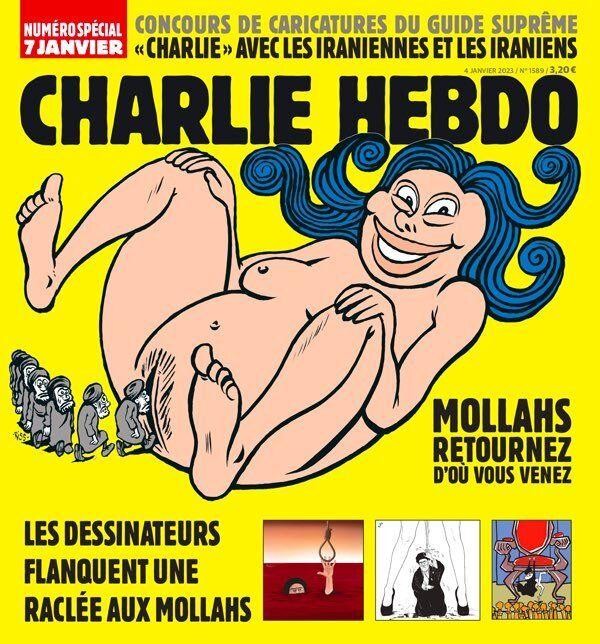
An January 7th marks the eighth anniversary of the attack on “Charlie Hebdo”. To mark the occasion, the Parisian satirical newspaper published a special edition yesterday. This does not look back into the bloody past, but deals with a no less brutal present: the suppression of the protests in Iran.
Hanger is a typical “Charlie” action: a competition for caricatures of the Iranian revolutionary leader Ali Khamenei announced in December. The initiative maliciously refers to a 1993 competition in which leaders of the Islamic Republic called for people to caricature Salman Rushdie, the author of the novel The Satanic Verses, which they hate. Of the more than 300 drawings that “Charlie Hebdo” received from all over the world, it publishes the 35 “most mature, most original and most appropriate”. In 2015, the editorial staff was almost wiped out because of cartoons of Mohammed – on the anniversary of the terrorist attack, the survivors, who are still under police protection, and their new colleagues are now coming up with a concentrated load of Khamenei satirical images.
Two main themes dominate. On the one hand, the cartoonists castigate the violence against protesters. One picture shows Khamenei with a screw attachment instead of his right hand; In front of him are prostheses with a baton, a pistol, a knife – “which one this time?” asks a speech bubble. A number of caricatures show hangman’s knots: as a turban on the head of the revolutionary leader; as a lifeline by which he tries to pull himself out of a bloody sea; as a rope that protesters tug at in order to pull the teeth out of the gaping mouth of the ayatollah. On the other hand, many of Iran’s drawings celebrate women as strong, proud fighters. A cowgirl attempts to lasso a fleeing Khamenei in panic. Transformed into a black vermin, the revolutionary leader is impaled by the stiletto heel of a pump. Four Rapunzel twist their hair into a rope from which the ayatollah dangles, vainly swinging for a pair of scissors, which one of the four is teasingly holding in front of his nose.
question of a reformed Islam
“All participants have won a place in Hell,” writes “Charlie Hebdo”. Iranian troll farms have flooded the satirical paper’s Twitter account with statements of support for Khamenei. This can be read in one of the 17 articles. These illuminate aspects of the current protest movement. A certain left, “which has always harbored tender feelings for the most broken regimes on earth, as long as they only hate America,” complains Gérard Biard, showing little interest in the “new Iranian revolution”. Concerning that of 1979, Yann Diener recalls the infatuation of Jean-Paul Sartre and Simone de Beauvoir, but above all of Michel Foucault. These would have “participated in the trivialization of a theocracy in the making”.
Whether another, reformed Islam is conceivable, Laure Daussy asks a question that has been rehearsed umpteen times. The answer, however, is original: the reporter tracked down a reflection group of so-called Neo-Mu’tazilists, adherents of a movement that had its heyday between the 9th and 11th centuries. Their maxims – contextualize, analyze, interpret, criticize – conjure up the western ideal of an enlightened Islam. Members of the group with whom Daussy speaks have nothing against female imams, same-sex marriages, and, if necessary, cartoons of Mohammed. The fact that the neo-Mu’tazilists have to meet secretly because of the Islamist threat speaks volumes.
Finally, a number of contributions address sexual liberation and women’s emancipation in Iran and its neighboring countries. The protests, which have been going on since mid-September, are known to have been triggered by the alleged killing of Mahsa Amini by members of the vice squad after she was arrested for wearing the hijab incorrectly. The 22-year-old was of Kurdish descent – the slogan “Women, Life, Freedom” currently chanted on Iran’s streets comes from Kurdistan, explains Natacha Devanda in an article that recalls the role of Kurdish women’s brigades in the fight against the terrorist organization “Islamic State”. Two articles from the spring of 1979 are amazingly topical. Sylvie Caster traveled to Iran with 15 other feminists (including Alice Schwarzer) for “Charlie Hebdo”. The author writes about her dissatisfaction with the veil requirement and the upheavals this causes among leftists; about Shia “feminists” who seek fulfillment in cooking and having children; and on the legalization of polygamy and the criminalization of homosexuality in the mullahs’ regime. Everything had already been said seven weeks after Khomeini’s seizure of power.







;Resize=(1200,627)&impolicy=perceptual&quality=medium&hash=418870f35b6f2c8ae31f46b9cae741971853e52c91dae802a89ddd7473bda86f)